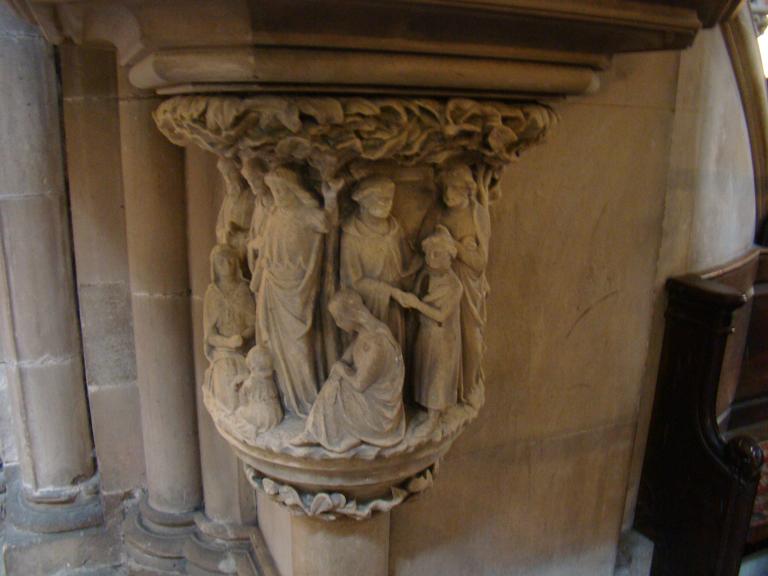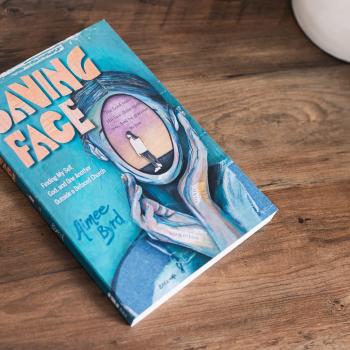 A shorter version of this was published last week with the Political Theology Network symposium on White Evangelicals and Right Wing Populism under the title “Where Does Evangelical Theology Lead?”. I am grateful that I was given permission to update and repost it here. I encourage you to read the other work in the symposium by Marcia Pally, Philip Gorski, Samuel Perry, David Gushee, and Khyati Joshi. Lastly, even if you read the original version of this essay last week, I encourage you to keep reading as you will find some significant additions. You will also find an editing clarification that my introduction was to Rev. Dr. Wil Gafney’s scholarship on Hagar–not to my introduction of Hagar. The editorial choice to bracket the description of Gafney made this less clear, although it was clear in the original talk.
A shorter version of this was published last week with the Political Theology Network symposium on White Evangelicals and Right Wing Populism under the title “Where Does Evangelical Theology Lead?”. I am grateful that I was given permission to update and repost it here. I encourage you to read the other work in the symposium by Marcia Pally, Philip Gorski, Samuel Perry, David Gushee, and Khyati Joshi. Lastly, even if you read the original version of this essay last week, I encourage you to keep reading as you will find some significant additions. You will also find an editing clarification that my introduction was to Rev. Dr. Wil Gafney’s scholarship on Hagar–not to my introduction of Hagar. The editorial choice to bracket the description of Gafney made this less clear, although it was clear in the original talk.
As always, I hope this helps.
“I’ve never heard the story of Hagar like that before!” The woman caught me in the narrow hallway. I was walking from the workshop following my lecture, trying to make my way to lunch. Her sleeve fluttered as she reached out to shake my hand. “It makes me want to reread [the Bible] again to see what else I’ve missed. Thank you.”
She wasn’t alone, either. Around twenty people caught me to say something similar—how my introduction to the reading of Hagar’s story in Genesis 16:1-13 by Rev. Wil Gafney, a womanist biblical scholar who holds the Right Rev. Sam B. Hulsey endowed chair in the Hebrew Bible at Brite Divinity School in Fort Worth, Texas, was new and transformational. It helped them see how much their own evangelical traditions obscured the reality of women in the Bible.
Instead of seeing Hagar as a mistake, as Abram and Sarai’s personal sin, as a warning for believers to not try and usurp God’s predetermined plan, as an allegory for those predestined to not inherit God’s blessings, or even as a predictor of violence in the Middle East—all common representations of Hagar’s story in evangelical theology, I had drawn from Gafney’s Womanist Midrash: A Reintroduction to the Women of the Torah and the Throne to remind my audience that Hagar was an enslaved child, raped by a significantly older man, and severely mistreated by a woman who was also a victim of sexual violence. Abram “pimped Sarai out,” in Gafney’s words, and should be remembered as a “survivor of sexual violence and domestic abuse,” (32-35). We needed to acknowledge, as Gafney reminds us, that Abram was complicit in the sexual abuse of both Sarai and Hagar.
The response I received from audience members like this woman should have encouraged me. It should have encouraged me how readily folk accepted the presentation of Hagar as a victim given justice from God in response to the injustice of a patriarchal system that dehumanized her for sexual labor. It should have encouraged me that so many were processing the cost of their own theology for women.
But it didn’t. At least not as much as it should have.
It didn’t encourage me because I know women have already paid too high a price.
For more than five decades, conservative evangelical theology has been teaching an increasingly restrictive gender hierarchy, arguing that God ordained male headship and female submission. This theology, openly repackaged as complementarianism in the late 1980s, became the primary understanding of biblical teachings about women and men for denominations like the Southern Baptist Convention (which currently claims to represent almost fifteen million people) as well as conservative evangelical churches more broadly.
Just take, for example, what Tommy Nelson, the long-time and well-known (in evangelical circles, at least) pastor of Denton Bible Church in North Texas, confessed to his congregation just last May (2022)–that a former youth pastor had sexually abused fourteen girls, eleven of which had been in Denton Bible’s youth group. Even more horrific was the revelation that the church had not only ignored multiple warning signs but had recommended the youth pastor to another church, where his abuse allegedly continued. They also failed to report the sexual assaults that began as early as 1997 despite having “credible accounts” that the allegations were true. One of the assault victims has recently spoken out, accusing the church of minimizing the sexual assaults, neglecting the victims, and (in an interview with Julie Roys) participating in “systemic injustice” toward women.
Denton Bible Church, like so much of the conservative evangelical world, aligns with complementarian theology.
Should it surprise us, then, that their recent story about sexual violence toward women and children is like so many other stories that we have heard from complementarian spaces? As I wrote in my recent book, The Making of Biblical Womanhood: How the Subjugation of Women Became Gospel Truth, we can no longer deny a link between the conservative gender theologies taught by evangelicals like Bill Gothard and Sovereign Grace Ministries (or even Denton Bible) and the allegations of sexual abuse made against them (206-207). We can’t ignore the voices of the more than 700 women, spanning two decades, victimized by men in Southern Baptist churches.
We also can’t ignore the growing body of scholarship that correlates conservative theology with more lenient acceptance of violence–including violence against women. Connecting the dots between white Christian nationalism, patriarchy, and violence, for example, sociologist Samuel Perry told Baptist News Global that, “the people in power–white Christian men, primarily–get the freedom. It is their country to do with as they will. They have a calling from God, and this country rightfully belongs to them. Everybody else gets the order, and that is non-whites, non-Christians, immigrants and often women. Included in that are sexual minorities, as well. And when they violate the order, they get violence and white Christian men are justified in perpetrating that violence.”
Did you hear that? White Christian men are justified in perpetuating violence against those who violate order, which includes the order of gender hierarchies.
I know that suggesting a correlation between complementarianism and violence towards women upsets people. But, y’all, given the current state of #ChurchToo in conservative evangelical churches, how can we NOT talk about it?
Just a few days ago, Scot McKnight drew my attention to the scholarship of Steven J. Sandage, the Albert and Jessie Danielsen Professor of Psychology of Religion and Theology at Boston University. Sandage argues that a correlation exists between New Calvinist ideology, that emphasizes gender complementarianism and hierarchal relationships and “domestic violence myth acceptance”–beliefs that rationalize & enable violence against women. As Sandage writes: “Many Christian theologies emphasize the possibility of finding meaning in suffering, but the New Calvinism seems seems to promote a rather stoic and un-empathetic attitude that valorizes suffering particularly among women…. Calvinist beliefs were related to higher levels of domestic violence myth acceptance and lower levels of social justice commitment.” What does this mean? It means that conservative evangelicals who espouse New Calvinism (think John Piper) are more likely to support rigid gender hierarchies and rationalize abuse towards women.
Isn’t that interesting (and terrifying)?
It certainly helps me better understand how Kevin DeYoung dismissed my own story of abuse with a reference to Proverbs 18:17 while simultaneously suggesting my experience with abuse invalidated my critique. It helps me understand how Doug Wilson could justify rape as a consequence for women who reject male headship as well as John Piper to suggest a battered woman endure being “smacked” for a night by her husband.
It even helps me understand how Debi Pearl as a woman could counsel other women to endure violence from their husbands. Yesterday Rebekah Mui quoted John Piper and Debi Pearl both making allowances for the abuse of women. She followed it with a screen shot from Debi Pearl’s book Created to be His Helpmeet which teaches a woman that if her husband is abusive, she should suffer it “as Jesus did.” As Pearl continues, “When [Jesus] was reviled and threatened, he suffered by committing himself to a higher judge who is righteous. You must commit yourself to the one who placed you under your husband’s command. Your husband will answer to God and you must answer to God for how you respond to your husband, even when he causes you to suffer.”
If that doesn’t support Sandage’s argument about ” a rather stoic and un-empathetic attitude” in conservative evangelical theology that rationalizes and enables violence against women, I’m not sure what does.
Denton Bible Church is just one more piece in a pattern, becoming clearer and clearer, between a theology that centers male power and enables violence against women. A pattern of men misusing their leadership to silence women, enforcing their authority with a rigid interpretation of scripture that (I would argue) is growing less and less sustainable among reputable scholars, and becoming so indifferent to female victims in their churches that Denton Bible Church didn’t even bother reporting the sexual assault of a teenage girl to the police.
Wait!
But what about Willow Creek? How does it fit in the pattern? Is abuse really more likely to flourish within complementarian evangelical spaces as opposed to egalitarian evangelical spaces?
Well, let’s look at some evidence.
Drawing from the scholarship of Kevin Giles, Lucy Bancroft, and Steven Tracy, Scot McKnight wrote in July 2020 that a correlation exists “between hierarchy and patriarchy and abuse by men of women. Males feeling entitled is a cultural product and complementarianism is such a culture that leads to such a product. Males who seize that culture’s control are more likely to abuse.”This is similar to the argument made by Natalie Collins, a “gender justice specialist whose work includes training individuals and organizations to respond to male violence” (as Megan Cornwell described her work in Premier Christianity). Just listen to some of Cornwell’s interview with Collins.
“At the heart of abuse, where it is found, is the belief in ‘owernship’ and ‘entitlement’ over another person, [Collins] says. But in complementarian churches that culture is more common, because power is already heavily weighted in favour of men. ‘And so while complementarian churches can create spaces where women who’ve been abused can feel safe, affirmed and cared for,’ [Collins] says, ‘what they can’t do is challenge those core beliefs of owernship and entitlement, because complementary theology, at root, says that men are spiritually afford certain roles and responsibilities that women just cannot have.'”
Complementarianism creates an environment which not only centers male power but defends it as God ordained. Is it any surprise that female victims of abuse might find it harder to be seen and heard within these spaces? While it is true that sexual abuse and violence against women flourish in all patriarchal spaces–including egalitarian spaces like Willow Creek, it is also true that some environments are more likely to foster attitudes of “ownership” and “entitlement” toward women than others. As I have so often lately, I would recommend to you Lisa Weaver Swartz’s Stained Glass Ceilings: How Evangelicals Do Gender and Practice Power. She finds that even when evangelical communities adapt egalitarian theology, they may continue centering men and marginalizing women, which means some of the same patriarchal patterns also found in complementarianism continue.
It also strikes me how some folk use Willow Creek to justify male-centered theology, sort of a “they do it to, we can’t be so bad” attitude, rather than to mourn the abuse of women. At the end of the day, what should matter more–that egalitarians have behaved badly too or that we should all strive to recognize the full humanity and equality of women as created in the image of God?
I think Kristin Du Mez, professor of history at Calvin College and author of Jesus and John Wayne: How White Evangelicals Corrupted a Faith and Fractured a Nation, summarizes the cost of conservative evangelical theology
for women well. Conservative evangelicals, she writes, preach “a mutually reinforcing vision of Christian masculinity—of patriarchy and submission, sex and power. It was a vision that promised protection for women but left women without defense, one that worshiped power and turned a blind eye to justice, and one that transformed the Jesus of the Gospels into an image of their own making,” (294).
I remember a provocative question once asked me in a conversation I had with theologian Lucy Peppiatt—the Principal of Westminster Theological Center in Gloucestershire, England, and the author of Rediscovering Scripture’s Vision for Women: Fresh Perspectives on Disputed Texts. “You have to consider,” she said, “where does your theology lead?”
As I was reading the news stories about Denton Bible Church, I thought about her question to me. Where does evangelical theology that preaches a God-ordained gender hierarchy lead? Does it lead to love, joy, peace, patience, kindness, kindness, goodness, faithfulness, gentleness, and self-control, as St. Paul explains in Galatians 5:22 are the fruits of a transformed life? Or does it lead centering men and marginalizing women; to justifying male authority while silencing female victims; to oppression, anger, fear, hate, and violence?
I fear the evidence from too many evangelicals—who neglect to see Hagar and Sarai as victims of sexual violence, who resist readings of Bathsheba as raped by David, who even use the Willow Creek story to justify male authority rather than to mourn the female victims—suggests the latter destination rather than the former. Afterall, if conservative evangelicals believe that God ordained a theology that centers men, it shouldn’t surprise us when men are centered.
I think it is time for conservative evangelicals who support complementarianism to recognize that even if correlation doesn’t equal causation, “correlation remains correlation.” Considering the circumstances in which we find ourselves–violence against women flourishing within the body of Christ–correlation alone should be enough to give us pause.













